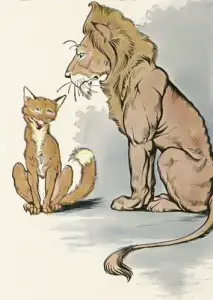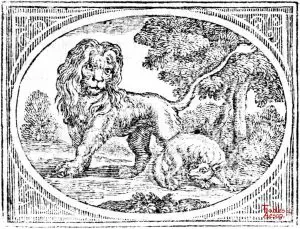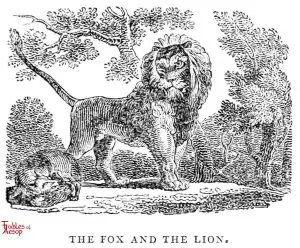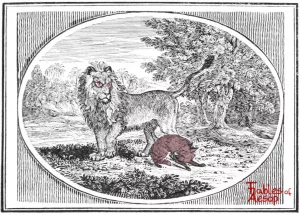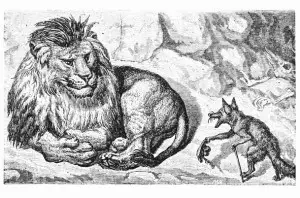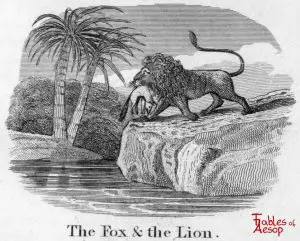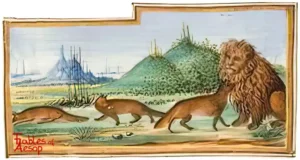A fox learns how to be comfortable around a lion. Other fables say to take care.
Familiarity breeds contempt.

Aesop For Children
A very young Fox, who had never before seen a Lion, happened to meet one in the forest. A single look was enough to send the Fox off at top speed for the nearest hiding place.
The second time the Fox saw the Lion he stopped behind a tree to look at him a moment before slinking away. But the third time, the Fox went boldly up to the Lion and, without turning a hair, said, “Hello, there, old top.”
Moral
Familiarity breeds contempt.
Acquaintance with evil blinds us to its dangers.

Eliot/Jacobs Version
When first the Fox saw the Lion he was terribly frightened, and ran away and hid himself in the wood. Next time however he came near the King of Beasts he stopped at a safe distance and watched him pass by. The third time they came near one another the Fox went straight up to the Lion and passed the time of day with him, asking him how his family were, and when he should have the pleasure of seeing him again; then turning his tail, he parted from the Lion without much ceremony.

Samuel Croxall
THE first time the Fox saw the Lion, he fell down at his feet, and was ready to die with fear. The second time, he took courage, and could even bear to look upon him. The third time he had the impudence to come up to him, to salute him, and to enter into familiar conversation with him.
THE APPLICATION
From this fable we may observe the two extremes in which we may fall, as to proper behaviour towards our superiors: the one is a bashfulness, proceeding either from a vicious, guilty mind, or a timorous rusticity: the other, an over-bearing impudence, which assumes more than becomes it, and so renders the person insufferable to the conversation of well-bred, reasonable people. But there is this difference between the bashfulness that arises from a want of education, and the shamefacedness that accompanies conscious guilt; the first, by a continuance of time and a nearer acquaintance, may be ripened into a proper, liberal behaviour; the other no sooner finds an easy, practicable access, but it throws off all manner of reverence, grows every day more and more familiar, and branches out into the utmost indecency and irregularity. Indeed, there are many occasions which may happen to cast an awe, or even a terror upon our minds at first view, without any just and reasonable grounds: but upon a little recollection, or a nearer insight, we recover ourselves, and can appear indifferent and unconcerned, where, before, we were ready to sink under a load of diffidence and fear. We should, upon such occasions, use our endeavours to regain a due degree of steadiness and resolution; but, at the same time, we must have a care that our efforts in that respect do not force the balance too much, and make it rise to an unbecoming freedom, and an offensive familiarity.

Thomas Bewick (The Fox and The Lion)
The first time the Fox saw the Lion, he fell down at his feet, and was ready to die with fear. The second time he took courage, and could even bear to look upon him. The third time he had the impudence to come up to him, to salute him, and to enter into familiar conversation with him.
APPLICATION.
From this Fable we may observe the two extremes in which we may fail as to a proper behaviour towards our superiors. The one is a bashfulness, proceeding either from a vicious guilty mind, or a timorous rusticity; the other an over-bearing impudence, which assumes more than becomes it, and so renders the person insufferable to the conversation of well-bred reasonable people. But there is a difference between the bashfullness which arises from a want of education, and the shame-facedness that accompanies conscious guilt: the first by time and a nearer acquaintance, may be ripened into a proper liberal behavour; the other no sooner finds an easy practicable access, but it throws off all manner of reverence, grows every day more and more familiar, and branches out at last into the utmost indecency and irregularity. Indeed there are many occasions which may happen to cast an awe, or even a terror, upon our minds at first view, without any just or reasonable grounds; but upon a little recollection, or a nearer insight, we recover ourselves, and can appear indifferent and unconcerned, where before we were ready to sink under a load of diffidence and fear. We should upon such occasions use our endeavours to regain a due degree of steadiness and resolution; but at the same time we must have a care that our efforts in that respect do not force the balance too much, and make it rise to an unbecoming freedom, and an offensive familiarity.
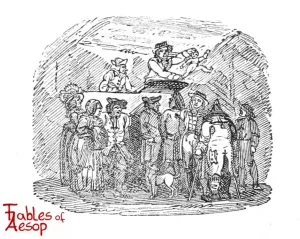

JBR Collection
The first time the Fox saw the Lion, he nearly died with fright. The next time, he gathered sufficient courage to have a good stare. The third time, he went boldly up to the Lion, and commenced a familiar conversation with him.

Townsend version
When a fox who had never yet seen a Lion, fell in with him by chance for the first time in the forest, he was so frightened that he nearly died with fear. On meeting him for the second time, he was still much alarmed, but not to the same extent as at first. On seeing him the third time, he so increased in boldness that he went up to him and commenced a familiar conversation with him.
Moral
Acquaintance softens prejudices.

Jefferys Taylor
WHEN the fox and the lion first happen’d to meet,
Poor Reynard fell down at his majesty’s feet,
So great was the terror inspired;
But the next time he met him, not quite so afraid,
When the lion approach’d an obeisance he made,
And after his health he inquired.
But the third time he met him, “Old crony,” said he,
“Pray whither so fast? I must say, to be free,
That you’re grown somewhat cool and unkind.”
The dignified lion deign’d not a reply;
But taking the fox to a river hard by,
Cool’d him, both in body and mind.
Thought the fox, whilst emerging in woe-begone state,
“This comes of one’s making too free with the great.”

L’Estrange version
A fox had the hap to fall into the walk of a lyon; (the first of the kind that ever he saw) and he was ready to drop down at the very sight of him. He came a while after, to see another, and was frighted still; but nothing to what he was before. It was his chance, after this, to meet a third Iyon; and he had the courage, then, to accost him, and to make a kind of an acquaintance with him.
Moral
Novelty surprises us, and we have naturally a horror for uncouth misshapen monsters; but ’tis our ignorance that staggers us, for upon custom and experience, all these buggs grow familiar, and easy to us.

Crane Poetry Visual
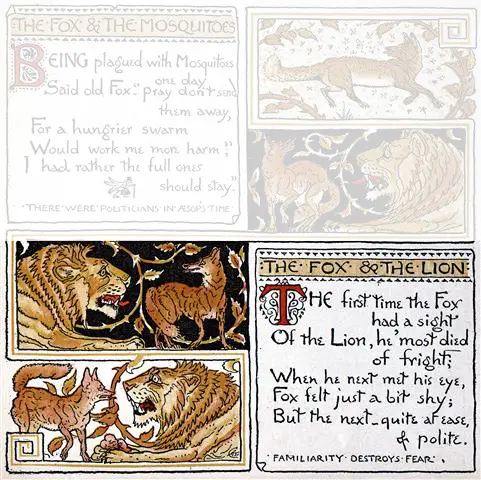
The first time the Fox had a sight
Of the Lion, he most died of fright;
When he next met his eye,
Fox felt just a bit shy;
But the next … quite at ease & polite.
Familiarity destroys fear.

Gherardo Image from 1480

Leo et Vulpes Territa
Vulpes, cum numquam leonem vidisset, postquam olim forte in eum incidit, primo quidem intuitu ita perterrefacta est ut parum abfuerit quin periret. Rursus autem eodem obviam reperto, tunc etiam, sed non ut antea, timuit. Tertio demum ipsum conspicata, audax ita fuit ut, accedens, cum eo colloqueretur.
Moral
Quae terribilia sunt, consuetudo blandiora reddit.
Perry #010
